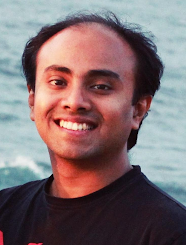Fall 2019 Joint CSC@USC/CommNetS-MHI Seminar Series
 |
Ariyan Kabir,
University of Southern California
|
Abstract
Recent advances in hardware capabilities, computation power, and control algorithms have physically enabled manipulators to perform highly complex tasks. Representative examples can be laundry folding, composite sheet layup, liquid pouring, mobile manipulation, surgery, etc. Using manipulators for complex tasks can significantly improve human productivity and eliminate the need for human involvement in tasks that pose risks to human safety. However, it is not feasible to manually program manipulators for complex tasks in high-mix low-volume applications as it will take a significant amount of time, effort, and cost. We could use manipulators in complex tasks in high-mix low-volume applications if manipulators could plan their own trajectories. Trajectory planning for manipulators performing complex tasks is a problem with several different challenges. It requires avoiding obstacles present in the robot's workspace, assigning appropriate tasks to the degrees of freedoms in robotic systems, respecting the kinematic and dynamic limitations of the manipulators, and identifying the appropriate trajectory and process parameters for achieving the desired task performance. This talk will present algorithmic foundations to address the problem of trajectory planning for robotic systems. First, I will present a context-dependent search strategy switching algorithm to navigate the discrete state-space search towards promising directions for point-to-point trajectory planning. Second, I will present a successive refinement strategy for path-constrained trajectory generation using non-linear parametric optimization with conflicting constraints. Finally, I will present an approach to integrate trajectory planning with task-agent assignment for carrying out complex operations with multiple robots.
Biosketch
Ariyan Kabir is interested in building smart robotic assistants by contributing at the intersection of artificial intelligence and robotics. His research focus is on motion planning and self-directed learning for high degrees of freedom systems. He is developing algorithms to find near-optimal solutions to computationally hard planning problems. He is currently working as a Postdoctoral Research Associate at the Viterbi School of Engineering, University of Southern California (USC). He completed his Ph.D. in Mechanical Engineering from USC in July 2019. He completed his B.Sc. in Electrical and Electronic Engineering from Bangladesh University of Engineering and Technology (BUET), Dhaka. Ariyan has won one best paper award, and two best poster awards from his research contributions.
